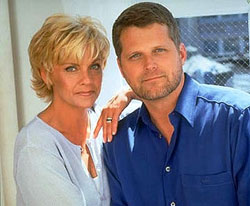 The announcement yesterday that CBS cancelled the soap opera after airing over seventy years of shows wasn’t a surprise but it certainly is a watershed moment in pop culture. Gone are the days of marketing drama in the afternoon to presumably bored, idle housewives. Instead, soaps like “Guiding Light” have been replaced by self-help and talk TV or reality programming , much as what has happened in the nighttime TV landscape.
The announcement yesterday that CBS cancelled the soap opera after airing over seventy years of shows wasn’t a surprise but it certainly is a watershed moment in pop culture. Gone are the days of marketing drama in the afternoon to presumably bored, idle housewives. Instead, soaps like “Guiding Light” have been replaced by self-help and talk TV or reality programming , much as what has happened in the nighttime TV landscape.
But housewives weren’t the only audience staple for soaps. Soaps have also had their heyday on college campuses where students would gather to watch their favorite soap on break between classes. Soaps have gone younger and hotter in casting as well to target the tween audiences at home during the summer months. They have even tried to be cutting edge and socially conscious by creating groundbreaking storylines regarding gay teens or Aids awareness. Yet all of this hasn’t stopped the decline of ratings. “Guiding Light” has been in the ratings basement for quite some time, but all soap operas are struggling to hold on to their viewers and almost all seem to be losing the battle.
I am not a current soap watcher, though I admit to being one of those college kids who liked that communal experience of watching someone else’s drama unfold on the tube. Yet yesterday’s announcement does interest me from a sociological perspective.
Soaps may have tried to make their reputation on evil twins and sexy romps in the hay, but shows like “Jerry Springer” are far more sleazy, and simplistic, feel-good, self-help shows like “Dr. Phil” are potentially more dangerous. I think both types of afternoon programming are meant to distract and numb the mind and spirit in similar ways to soaps, but I don’t think people ever mistook soaps for reality. Shows like “Springer” desire to make audiences feel good by degrading others, while shows like “Dr. Phil” tend to make us think major life problems can be solved in sixty minutes.
I personally would take watching someone come back to life for the third time after being locked away in a mental hospital by her seventh husband, over much of what is on in daytime TV. Then again, that’s the other pressing issue; I don’t have to choose anymore, I just watch what I want to on my computer. That’s the cultural paradox: the more I don’t have to choose, the more quality TV suffers.
.


